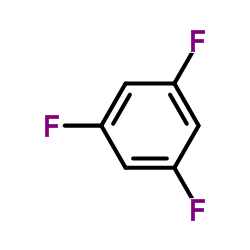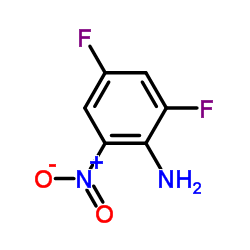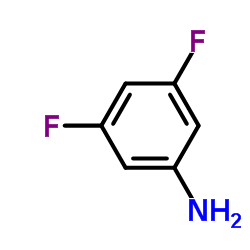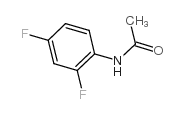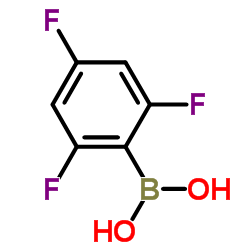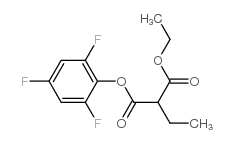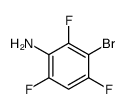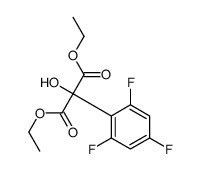2367-76-2
| 中文名 | 1-溴-2,4,6-三氟苯 |
|---|---|
| 英文名 | 1-Bromo-2,4,6-trifluorobenzene |
| 中文别名 |
2-溴-1,3,5-三氟苯2,4,6-三氟溴苯
2,4,6-三氟溴苯 2,4,6-三溴氟苯 2-溴-1,3,5-三氟苯 |
| 英文别名 |
2,4,6-trifluorophenyl bromide
1-Bromo-2,4,6-triflu 1-Bromo-2,4,6-trifluorobezene 2-Bromo-1,3,5-trifluorobenzene 2,4,6-Trifluorobromobenzene 2,4,6-Trifluoro-1-bromobenzene 1,3,5-Trifluoro-2-bromobenzene Benzene, 2-bromo-1,3,5-trifluoro- 1-bromo-2,4,6-trifluoro-benzene 1-Bromo-2,4,6-trifluorobenzene Benzene,2-bromo-1,3,5-trifluoro MFCD00000334 FR CF EF BE EINECS 219-125-9 |
| 密度 | 1.8±0.1 g/cm3 |
|---|---|
| 沸点 | 135.8±35.0 °C at 760 mmHg |
| 熔点 | 3.5 °C(lit.) |
| 分子式 | C6H2BrF3 |
| 分子量 | 210.979 |
| 闪点 | 32.1±21.8 °C |
| 精确质量 | 209.929184 |
| LogP | 3.02 |
| 外观性状 | 无色液体 |
| 蒸汽压 | 9.4±0.2 mmHg at 25°C |
| 折射率 | 1.486 |
| 储存条件 | 保持容器密封,放入紧密的出藏器内,储存在阴凉,干燥的地方 |
| 稳定性 | 避免氧化物接触 |
| 分子结构 | 1、 摩尔折射率:33.92 2、 摩尔体积(m3/mol):118.2 3、 等张比容(90.2K):279.1 4、 表面张力(dyne/cm):31.0 5、 极化率(10 -24cm 3):13.44 |
| 计算化学 | 1.疏水参数计算参考值(XlogP):2.9 2.氢键供体数量:0 3.氢键受体数量:3 4.可旋转化学键数量:0 5.互变异构体数量:无 6.拓扑分子极性表面积0 7.重原子数量:10 8.表面电荷:0 9.复杂度:108 10.同位素原子数量:0 11.确定原子立构中心数量:0 12.不确定原子立构中心数量:0 13.确定化学键立构中心数量:0 14.不确定化学键立构中心数量:0 15.共价键单元数量:1 |
| 更多 | 1. 性状:无色液体 2. 密度(g/L,20ºC):1.79 3. 相对蒸汽密度(g/mL,空气=1):未确定 4. 熔点(ºC):3-4 5. 沸点(ºC,常压):140-141 6. 沸点(ºC 10mmHg):未确定 7. 折射率(nD20):1.485 8. 闪点(ºF):137 9. 比旋光度():未确定 10. 自燃点或引燃温度(ºC):58 11. 蒸气压(Pa,20ºC):未确定 12. 饱和蒸气压(kPa,20ºC):未确定 13. 燃烧热(KJ/mol):未确定 14. 临界温度(ºC):未确定 15. 临界压力(KPa):未确定 16. 油水(辛醇/水)分配系数的对数值:未确定 17. 爆炸上限(%,V/V):未确定 18. 爆炸下限(%,V/V):未确定 19. 溶解性:不能拌和的或难以拌和 |
Synonym:None Section 2 - COMPOSITION, INFORMATION ON INGREDIENTS
Risk Phrases: 10 36/37/38 Section 3 - HAZARDS IDENTIFICATION EMERGENCY OVERVIEW
Flammable. Irritating to eyes, respiratory system and skin.The toxicological properties of this material have not been fully investigated. Potential Health Effects Eye: May cause eye irritation. Skin: May cause skin irritation. Ingestion: May cause irritation of the digestive tract. The toxicological properties of this substance have not been fully investigated. Inhalation: May cause respiratory tract irritation. The toxicological properties of this substance have not been fully investigated. Vapors may cause dizziness or suffocation. Chronic: No information found. Section 4 - FIRST AID MEASURES Eyes: Flush eyes with plenty of water for at least 15 minutes, occasionally lifting the upper and lower eyelids. Get medical aid. Skin: Get medical aid. Flush skin with plenty of water for at least 15 minutes while removing contaminated clothing and shoes. Wash clothing before reuse. Ingestion: Never give anything by mouth to an unconscious person. Get medical aid. Do NOT induce vomiting. If conscious and alert, rinse mouth and drink 2-4 cupfuls of milk or water. Inhalation: Remove from exposure and move to fresh air immediately. If not breathing, give artificial respiration. If breathing is difficult, give oxygen. Get medical aid. Notes to Physician: Antidote: None reported. Section 5 - FIRE FIGHTING MEASURES General Information: As in any fire, wear a self-contained breathing apparatus in pressure-demand, MSHA/NIOSH (approved or equivalent), and full protective gear. Vapors may form an explosive mixture with air. Vapors can travel to a source of ignition and flash back. During a fire, irritating and highly toxic gases may be generated by thermal decomposition or combustion. Will burn if involved in a fire. Use water spray to keep fire-exposed containers cool. Containers may explode in the heat of a fire. Flammable liquid and vapor. Vapors may be heavier than air. They can spread along the ground and collect in low or confined areas. Extinguishing Media: For small fires, use dry chemical, carbon dioxide, water spray or alcohol-resistant foam. For large fires, use water spray, fog, or alcohol-resistant foam. Use water spray to cool fire-exposed containers. Water may be ineffective. Do NOT use straight streams of water. Section 6 - ACCIDENTAL RELEASE MEASURES General Information: Use proper personal protective equipment as indicated in Section 8. Spills/Leaks: Absorb spill with inert material (e.g. vermiculite, sand or earth), then place in suitable container. Clean up spills immediately, observing precautions in the Protective Equipment section. Remove all sources of ignition. Use a spark-proof tool. Provide ventilation. A vapor suppressing foam may be used to reduce vapors. Section 7 - HANDLING and STORAGE Handling: Wash thoroughly after handling. Use with adequate ventilation. Ground and bond containers when transferring material. Use spark-proof tools and explosion proof equipment. Avoid contact with eyes, skin, and clothing. Empty containers retain product residue, (liquid and/or vapor), and can be dangerous. Keep container tightly closed. Keep away from heat, sparks and flame. Avoid ingestion and inhalation. Do not pressurize, cut, weld, braze, solder, drill, grind, or expose empty containers to heat, sparks or open flames. Storage: Keep away from heat, sparks, and flame. Keep away from sources of ignition. Store in a tightly closed container. Store in a cool, dry, well-ventilated area away from incompatible substances. Flammables-area. Section 8 - EXPOSURE CONTROLS, PERSONAL PROTECTION Engineering Controls: Use adequate ventilation to keep airborne concentrations low. Exposure Limits CAS# 2367-76-2: Personal Protective Equipment Eyes: Wear appropriate protective eyeglasses or chemical safety goggles as described by OSHA's eye and face protection regulations in 29 CFR 1910.133 or European Standard EN166. Skin: Wear appropriate protective gloves to prevent skin exposure. Clothing: Wear appropriate protective clothing to prevent skin exposure. Respirators: A respiratory protection program that meets OSHA's 29 CFR 1910.134 and ANSI Z88.2 requirements or European Standard EN 149 must be followed whenever workplace conditions warrant respirator use. Section 9 - PHYSICAL AND CHEMICAL PROPERTIES Physical State: Liquid Color: colorless Odor: Not available. pH: Not available. Vapor Pressure: Not available. Viscosity: Not available. Boiling Point: 140.5 deg C Freezing/Melting Point: 3.5 deg C Autoignition Temperature: Not available. Flash Point: 137 deg F ( 58.33 deg C) Explosion Limits, lower: Not available. Explosion Limits, upper: Not available. Decomposition Temperature: Solubility in water: Specific Gravity/Density: 1.7900g/cm3 Molecular Formula: C6H2BrF3 Molecular Weight: 210.99 Section 10 - STABILITY AND REACTIVITY Chemical Stability: Stability unknown. Conditions to Avoid: Incompatible materials, ignition sources, excess heat. Incompatibilities with Other Materials: Oxidizing agents. Hazardous Decomposition Products: Carbon monoxide, irritating and toxic fumes and gases, carbon dioxide. Hazardous Polymerization: Has not been reported Section 11 - TOXICOLOGICAL INFORMATION RTECS#: CAS# 2367-76-2 unlisted. LD50/LC50: Not available. Carcinogenicity: 1-Bromo-2,4,6-trifluorobenzene - Not listed by ACGIH, IARC, or NTP. Section 12 - ECOLOGICAL INFORMATION Section 13 - DISPOSAL CONSIDERATIONS Dispose of in a manner consistent with federal, state, and local regulations. Section 14 - TRANSPORT INFORMATION IATA Shipping Name: FLAMMABLE LIQUID, N.O.S. Hazard Class: 3 UN Number: 1993 Packing Group: III IMO Shipping Name: FLAMMABLE LIQUID, N.O.S. Hazard Class: 3 UN Number: 1993 Packing Group: III RID/ADR Shipping Name: FLAMMABLE LIQUID, N.O.S. Hazard Class: 3 UN Number: 1993 Packing group: III Section 15 - REGULATORY INFORMATION European/International Regulations European Labeling in Accordance with EC Directives Hazard Symbols: XI Risk Phrases: R 10 Flammable. R 36/37/38 Irritating to eyes, respiratory system and skin. Safety Phrases: S 9 Keep container in a well-ventilated place. S 16 Keep away from sources of ignition - No smoking. S 26 In case of contact with eyes, rinse immediately with plenty of water and seek medical advice. S 28A After contact with skin, wash immediately with plenty of water. S 33 Take precautionary measures against static discharges. S 37 Wear suitable gloves. S 37/39 Wear suitable gloves and eye/face protection. S 45 In case of accident or if you feel unwell, seek medical advice immediately (show the label where possible). WGK (Water Danger/Protection) CAS# 2367-76-2: No information available. Canada None of the chemicals in this product are listed on the DSL/NDSL list. CAS# 2367-76-2 is not listed on Canada's Ingredient Disclosure List. US FEDERAL TSCA CAS# 2367-76-2 is not listed on the TSCA inventory. It is for research and development use only. SECTION 16 - ADDITIONAL INFORMATION N/A |
|
生态学数据: 通常对水是不危害的,若无政府许可,勿将材料排入周围环境。
|
| 符号 |


GHS02, GHS07 |
|---|---|
| 信号词 | Warning |
| 危害声明 | H226-H315-H319-H335 |
| 警示性声明 | P261-P305 + P351 + P338 |
| 个人防护装备 | Eyeshields;full-face respirator (US);Gloves;multi-purpose combination respirator cartridge (US);type ABEK (EN14387) respirator filter |
| 危害码 (欧洲) | Xi:Irritant; |
| 风险声明 (欧洲) | R10;R36/37/38 |
| 安全声明 (欧洲) | S26-S37/39-S16 |
| 危险品运输编码 | UN 1993 3/PG 3 |
| WGK德国 | 3 |
| 包装等级 | III |
| 危险类别 | 3 |
| 海关编码 | 2903999090 |
|
~98% 
2367-76-2 |
| 文献:BASF SE Patent: US2010/56820 A1, 2010 ; Location in patent: Page/Page column 4 ; |
|
~% 
2367-76-2 |
| 文献:Journal of the American Chemical Society, , vol. 73, p. 153 Journal of the American Chemical Society, , vol. 81, p. 94,98 |
|
~% 
2367-76-2 |
| 文献:Journal of the American Chemical Society, , vol. 73, p. 153 Journal of the American Chemical Society, , vol. 81, p. 94,98 |
|
~% 
2367-76-2 |
| 文献:Journal of the American Chemical Society, , vol. 73, p. 153 Journal of the American Chemical Society, , vol. 81, p. 94,98 |
|
~% 
2367-76-2 |
| 文献:Journal of the American Chemical Society, , vol. 73, p. 153 Journal of the American Chemical Society, , vol. 81, p. 94,98 |
|
~% 
2367-76-2 |
| 文献:Journal of the American Chemical Society, , vol. 73, p. 153 Journal of the American Chemical Society, , vol. 81, p. 94,98 |
| 上游产品 5 | |
|---|---|
| 下游产品 5 | |
| 海关编码 | 2903999090 |
|---|---|
| 中文概述 | 2903999090 其他芳烃卤化衍生物. 增值税率:17.0% 退税率:9.0% 监管条件:无 最惠国关税:5.5% 普通关税:30.0% |
| 申报要素 | 品名, 成分含量, 用途 |
| Summary | 2903999090 halogenated derivatives of aromatic hydrocarbons VAT:17.0% Tax rebate rate:9.0% Supervision conditions:none MFN tariff:5.5% General tariff:30.0% |


